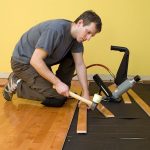
For most homeowners, making the leap into hardwood flooring is not an easy task. Going through a renovation process can be a difficult one, especially if you don’t know where to begin in the process. Most people know they like the look of hardwood floors, but don’t know what type of flooring is best for their home or how much flooring they should even buy. Below, we’ve rounded up some of the most common frequently asked questions our customers come to us with before buying their floors.
What is the difference between solid wood, laminate, and engineered wood flooring?
In simple terms, solid wood floors are just what they say they are--solid wood. The entire board is made up of a plank from a species of wood. Engineered wood floors, on the other hand, only have a top layer of solid wood. The rest of the board is made of fibers from waste woods that are fused together in a high pressure manufacturing process. Laminate floors are made to look like wood, but are actually made up of synthetic materials
What is the hardest flooring I can buy?
The Janka Scale does a great job of rating floors on how hard they are. We created a breakdown here that helps you determine which floor is best for each room in your home based on their hardness. Of the options we carry, Brazilian Cherry and Acacia wood floors are some of the hardest and most durable options to choose from.
How much hardwood flooring do I need to buy?
A simple, but efficient calculation you should go buy is this: square footage + 5-10% of your square footage for waste cuts.
What does Handscraped mean?
This popular style of handscraped wood flooring basically means the floors are designed to have the look of an older style flooring, scraped by hand. These floors are made to look like they have a bit of wear, but still have a modern finish to protect the floor.
What types of rooms are best for wood floors?
We generally think just about every room in your home can work well with hardwood floors! However, be sure to speak with a professional if you are thinking about wood floors for rooms with fluctuating humidity like bathrooms and basements. As a general rule, solid wood is more apt to expand than engineered and laminate floors.


